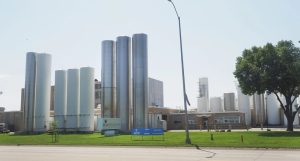
Earlier this week he paused long enough from his routine to go on live network television to talk about issues that impact his dairy.
Alongside family, Pollack—a fifth-generation dairy farmer—milks 150 cows in East Central Wisconsin. In addition to dairying, the Pollacks farm 850 acres of corn, alfalfa, soybeans and wheat, along with growing lima and canning beans, and running a 20-beef cow operation.
Fox News reached out to Pollack ahead of the last Presidential election and recently connected with the Wisconsin farmer to talk about how the rising inflation is impacting his farming decisions.
Pollack shared to the morning television audience that the cost of fertilizer, fuel and other farm equipment has skyrocketed.
“It’s a real challenge because farmers are going to the field with a really expensive set of tools this year,” Pollack told Fox News.
Sharing alarming statistics—like ammonia hydrous up 235% and nitrogen up 149%—Pollack says farmers are forced to come up with plan B.
“Inflation touches every aspect of the farm,” he says.
What worries Pollack the most is market vulnerability. He told Fox News that the industry has set some hefty goals to become carbon neutral in 2050, but he believes efforts need to come into place to help farmers tackle the short-term problems as well.
Risk Management
Like most dairy farmers, Pollack is happy to see the rise in milk checks and says that despite getting $24/cwt for his milk, rising inputs are not generating the margin he hoped for.
Pollack shares that he tries to be aggressive in using forward contracts, especially on the input side of things. He locked in canola meal and soybean meal last year. He says considering the current market situation, he is extremely satisfied with his marketing decisions. In terms of contracting milk, he has ‘dabbled,’ but says he focuses more on the feed input side.
He also carried his marketing philosophy over to locking in seed prices earlier this year and pre-paying for fertilizer to save some money, as well as contracting diesel fuel.
“We actually contracted the majority of our diesel for around $3.15/gallon,” he remarks. “Which didn’t seem like a great price at the time.”
Sustainable Efforts
Ideally, Pollack’s goal is to get the planter rolling the first week of May—a mark that doesn’t look attainable this year, as Pollack shares East-Central Wisconsin temperatures have been below average and not conducive to planting.
With approximately half of his crops going back to feed his herd, Pollack is utilizing more acres for corn this year compared to last year.
“We kind of backed off the wheat acres a bit and I really would have loved to plant a few more wheat acres,” he says. “But our crop rotation allowed for more corn acres this year.”
Along with 40 other farmers, Pollack is part of the Upper Fox River Watershed Demonstration Network –illustrating green efforts by reducing carbon footprint and using more cover crops. That initiative led to implementing more no-till acres on Pollack’s farm.
With cover crops, Pollack uses a practice called planting green meaning that he plants a crop into a living cover crop that will be terminated shortly after planting.
Pollack happily reports his feed inventories allow him to be more aggressive on the cash crops.
“We’ve got plenty of feed, so we can capitalize on that,” he says.
The Wisconsin farmer says his biggest fear is rising inflation and interest rates.
“I certainly don’t want to see us in a position like the late 70s, early 80s, with double-digit interest rates, trying to finance to keep everything rolling,” he says.
Pollack and his wife, Kelly have four children under the age of 6. He says at the end of the day he loves working with his family.
“I see my kids thrive and take interest on the farm,” he says. “And despite being a small operation, I have a great team of people that I get to work with—that really helps make it all fun.”

























